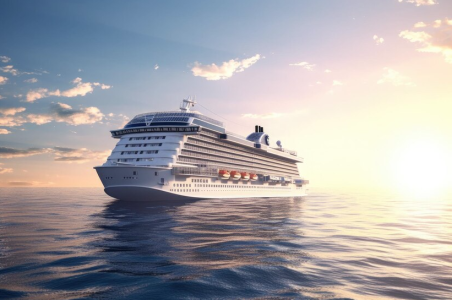Cruise prices skyrocket up to 43 per cent, hikes predicted to continue
By
VanessaC
- Replies 5
Dreaming of finally taking that bucket list cruise but worried about it being too pricey?
Well, you're not alone!
Cruise ticket prices from operators such as Carnival and Royal Caribbean have reportedly shot up a massive 43 per cent compared to 2019 or pre-COVID times, according to reports.
That’s not all: according to industry experts, prices may also continue to climb.
Cruise Critic—a cruise review site managed by Tripadvisor—said an average Caribbean cruise in December now costs $736 per person, which is 43 per cent higher than in December of 2019.
On average, the price of a cruise in December reportedly increased by 37 per cent from last year, during the time when cruises were perceived as 'super spreader' gatherings.
Former Carnival executive Carlos Torres de Navarra said that ever since the pandemic eased, 'cruising was always going to be the last one people realised was safe or not'.
This is why travellers were quick to notice 'that airline tickets and land-based resorts have gotten more expensive'. However, 'the ocean’s just now rising', according to Mr de Navarra.
Despite implementing price increases in cruise ships, the former executive claimed that cruise discounts are 'recession-proof in some respect'.
'Travel agencies have quoted cruises offering somewhere between a 50% and 70% discount to land-based vacations,' he added.
Take it from retired Aussie couple Marty and Jess Ansen, who lived in cruise shops for nearly 500 days—longer than most of the ship crew, including captains—after they had realised that it’s cheaper to cruise around the world than staying at a retirement home.
'If the cruising experience was impaired coming out of the pandemic, then I think there would have been a different concern,' de Navarra explained.
'Clearly, that’s not a concern.'
Despite the rising costs of oil being a ‘headwind' according to de Navarra, it is not the culprit for the price hikes.
'They’re raising prices naturally — fuel or no fuel, the demand is there for them to be raising prices,' Truist Securities Analyst Patrick Scholes said.
'The cruise industry right now is focusing on: “How do I create and improve on destinations that are close to where my ships start and end to mitigate this fuel issue?”' de Navarra said.
The real reason for the price hikes appears to be operators' intensified investment in destinations and customer experiences.
For example, operators have been closing in on areas such as Nassau, the capital of Bahamas, where Royal Caribbean plans to open a 17-acre Royal Beach Club in 2025.
Based on historical data, cruise operators have spent as much as half a billion dollars to build ports that they deem would generate demand—projects such as the Calypso Cove development in Long Island, Bahamas.
Calypso Cove, developed by Azul Destinations, has tapped merchant bank AMA Capital Partners to raise over $250 million in funding and will reportedly start accepting as many as 1 million passengers per year from different cruise operators.
According to de Navarra: 'The cruise industry started getting outside of its core business of cruise experience and got into [the] destination experience.'
'The challenge is that they [cruise lines] have a ton of debt that they have to deal with that they didn’t have before,' he added about the millions in debt cruise operators took on to get through the pandemic.
However, he explained that 'debt will be paid off faster because ticket prices are higher.'
 Have you noticed cruise prices going up? Is it affecting your cruise plans? Share your experiences and money-saving tips with us below!
Have you noticed cruise prices going up? Is it affecting your cruise plans? Share your experiences and money-saving tips with us below!
Well, you're not alone!
Cruise ticket prices from operators such as Carnival and Royal Caribbean have reportedly shot up a massive 43 per cent compared to 2019 or pre-COVID times, according to reports.
That’s not all: according to industry experts, prices may also continue to climb.
Cruise Critic—a cruise review site managed by Tripadvisor—said an average Caribbean cruise in December now costs $736 per person, which is 43 per cent higher than in December of 2019.
On average, the price of a cruise in December reportedly increased by 37 per cent from last year, during the time when cruises were perceived as 'super spreader' gatherings.
Former Carnival executive Carlos Torres de Navarra said that ever since the pandemic eased, 'cruising was always going to be the last one people realised was safe or not'.
This is why travellers were quick to notice 'that airline tickets and land-based resorts have gotten more expensive'. However, 'the ocean’s just now rising', according to Mr de Navarra.
Despite implementing price increases in cruise ships, the former executive claimed that cruise discounts are 'recession-proof in some respect'.
'Travel agencies have quoted cruises offering somewhere between a 50% and 70% discount to land-based vacations,' he added.
Take it from retired Aussie couple Marty and Jess Ansen, who lived in cruise shops for nearly 500 days—longer than most of the ship crew, including captains—after they had realised that it’s cheaper to cruise around the world than staying at a retirement home.
'If the cruising experience was impaired coming out of the pandemic, then I think there would have been a different concern,' de Navarra explained.
'Clearly, that’s not a concern.'
Despite the rising costs of oil being a ‘headwind' according to de Navarra, it is not the culprit for the price hikes.
'They’re raising prices naturally — fuel or no fuel, the demand is there for them to be raising prices,' Truist Securities Analyst Patrick Scholes said.
'The cruise industry right now is focusing on: “How do I create and improve on destinations that are close to where my ships start and end to mitigate this fuel issue?”' de Navarra said.
The real reason for the price hikes appears to be operators' intensified investment in destinations and customer experiences.
For example, operators have been closing in on areas such as Nassau, the capital of Bahamas, where Royal Caribbean plans to open a 17-acre Royal Beach Club in 2025.
Based on historical data, cruise operators have spent as much as half a billion dollars to build ports that they deem would generate demand—projects such as the Calypso Cove development in Long Island, Bahamas.
Calypso Cove, developed by Azul Destinations, has tapped merchant bank AMA Capital Partners to raise over $250 million in funding and will reportedly start accepting as many as 1 million passengers per year from different cruise operators.
According to de Navarra: 'The cruise industry started getting outside of its core business of cruise experience and got into [the] destination experience.'
'The challenge is that they [cruise lines] have a ton of debt that they have to deal with that they didn’t have before,' he added about the millions in debt cruise operators took on to get through the pandemic.
However, he explained that 'debt will be paid off faster because ticket prices are higher.'
Key Takeaways
- Cruise ticket prices have surged by 43 per cent, with some operators setting prices higher than pre-pandemic levels due to increasing demand.
- The average price for a five-night Caribbean cruise in December 2023 is set to be $736 per person, marking a 37 per cent increase from 2022.
- To mitigate the rising cost of oil, cruise lines are shifting focus on improving destinations closer to the US and investing in port destinations that would generate demand.








